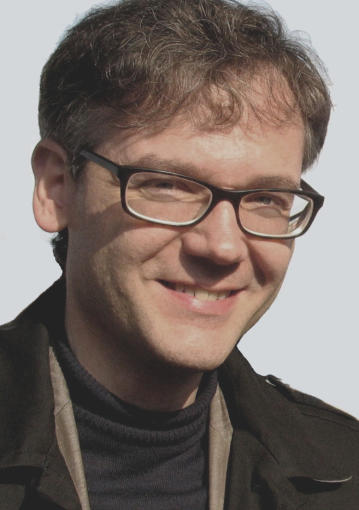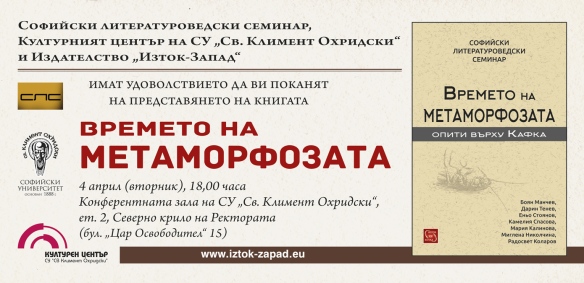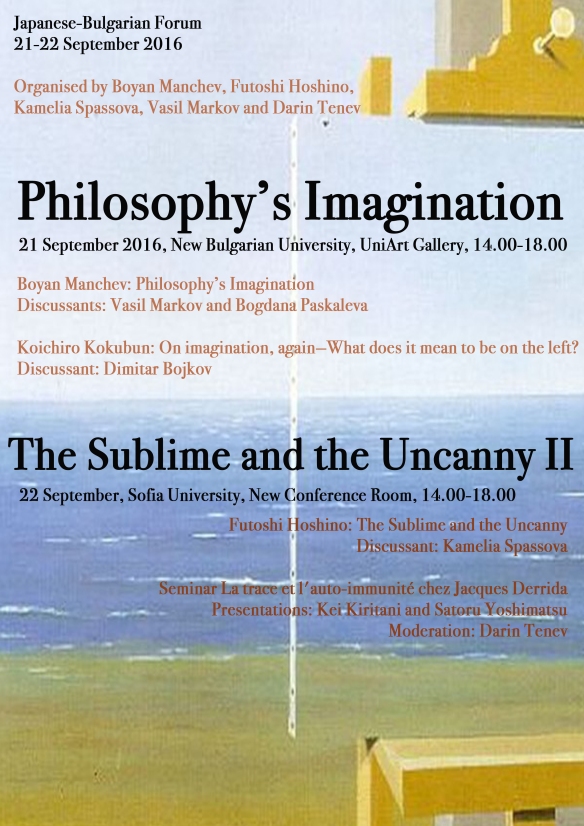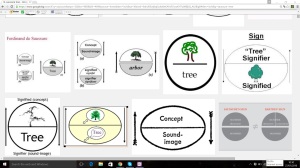For English, see the above posting.

Наред с онтологическите, морално-етическите и естетическите аспекти на метаморфозата на Греогр Замза в насекомо, интерпретациите на прочутата новела на Кафка прибавят въпроса – или по-скоро ги видоизменят чрез въпроса за социално-критическия статут на това превращение. Дали ставането-животно на Грегор е неуспял опит за бунт срещу едипалните структури на капитализма, както е според някои тълкуватели? Дали е успял бунт, доколкото отхвърля програмиращите ефекти на логоса и се обръща към музиката, както твърдят други? Дали е чисто страдателен регрес, който успява или не успява да произнесе своята заклеймяваща присъда над социалния ред? Дали тази метаморфоза е внезапна или разтеглена във времето? Дали въобще има метаморфоза? В продължение на повече от година Софийският литертуроведски семинар посвети своите затворени сбирки на внимателен прочит на новелата в перспективата на собствените си методологически питания. Резултатите от тази работа бяха публично представени (със значителни съкращения) на 21.10.2015г. Тук предлагаме резюметата на статиите, които в пълния си вид ще се появят в сборник през 2016г.
„МЕТАМОРФОЗАТА” НА ФРАНЦ КАФКА: ПРЕОБРАЖЕНИЯ НА ОТЧУЖДЕНИЕТО
Радосвет Коларов
Статията разглежда разказа на Франц Кафка „Метаморфозата” като алегория на човешката самота и отчуждение, отчаянието на човека пред невъзможността да бъде разбран и да установи комуникация със света. Изследвано е превръщането на метафорични изрази от всекидневната реч във фикционални реалности; загубата на речта на героя Грегор Замза, превърнал се в насекомо, като постепенно засилващ се процес; ролята на предметите в изграждането/разрушаването на човешката идентичност; двойнственият импулс – на скриване от погледите на близките, и, от друга страна, клаустрофобния порив към напускане на стаята, мястото на метаморфозата – приобщаване към семейното обкръжение, опит, завършил с провал и доброволно приета смърт.
МОДЕЛИРАНЕ, МЕТАМОРФОЗА: ФОРМАЛНИТЕ УКАЗАНИЯ НА КАФКА
Дарин Тенев
Метаморфозата на Франц Кафка поставя темата за метаморфозата като въпрос. Настоящата статия е опит да се прочете повествованието като се използват собствените му елементи като инструменти, като формални указания, които правят възможно проследяването на начина, по който то изгражда модел на това какво е метаморфоза. Чрез внимателен прочит на началните четири абзаца, използвани като леща, през която да се фокусира останалата част от произведението, статията развива идеята за една доминантна форма на метаморфоза (обхващаща икономически обмен, пътуване, комуникация), която слага край на метаморфозата. Парадоксът на произведението се крие в това, че краят на метаморфозата, прекъсването на трансформацията, на свой ред е метаморфоза, нов вид изменение.
МЕТАМОРФОЗА И ИЗВАЖДАНЕ: ЛОГИКА И БИОГРАФИЯ В ПРИЗРАКА НА ЧОВЕШКОТО
Миглена Николчина
Въпросът дали ставането-животно на Грегор Замза ескалира страдателността му на жертва на капиталистическия ред, или й се съпротивлява, се превръща в арена на сблъсък в Източна Европа от ерата на Студената война, когато Кафка е произведен от комунистическата номенклатура в пряк причинител на събитията от Пражката пролет. Предлаганият текст преразглежда този дебат през идеята на Мамардашвили за превърнатите форми – Марксовата verwandelte Form – като не само ирационални, но и абсолютно непрозрачни, напълно отрязани от връзките и процесите, които са ги произвели. Всъщност думата от заглавието на Кафка Verwandlung се появява в заглавието на втората част на „Капиталът“, за да обозначи ни повече, ни по-малко от трансформацията на парите в капитал. Ако прочетем през Марксовото заглавие омонимното заглавие на Кафка, ставането-животно на Грегор ще се окаже превърната форма на механизма, който натурализира производството на капитализма като такъв. Настоящият анализ се опитва да „мине в гръб“ (по израза на Мамардашвили) на тази натурализация, като съпоставя ставането-животно и ставането-машина чрез успореден прочит на новелата на Кафка (един мъж се превръща в насекомо) и новелата на Станислав Лем „Маска“ (една жена се оказва насекомоподобна машина). Тъждествеността на резултата като изчезване на човека в двата случая позволява диференцирането на метаморфозата като изваждане и по такъв начин изявява една различна логика, ако не логика на изключителното, то във всеки случай логика на изключеното, налагаща преразглеждане на въпроса за човешкото.
НЕГАТИВЕН АНАГНОРИСИС: СЕРИЯ ОТ ОТРИЦАНИЯ ПРИ КАФКА
Мария Калинова, Камелия Спасова
Началното отрицателно преображение на Грегор Замза в „Метаморфозата“ на полу-чудовище, полу-неживотно е последвано от процес на отразпознаване, ковто в нашето четене представлява серия от отрицания: ungeheuer, Ungeziefer, Untier. Това е преходът, който ще означим като негативен анагнорисис и по модела на Аристотел, това ще е преход от знание към незнание.
Първото отрицание, което дефинирахме с помощта на Фройдовата теоретичната рамка, е отрицание-повторение. Неговият ясен маркер е заличаването на разликата с противоположното. Докато се отрицава, то всъщност повтаря. Вторият модус на отрицанието изведохме през Адорно – като отрицание, прекъсващо повторението. Отрицанието-прекъсване успява да се материализира в сингуларен обект на отрицанието. При Адорно този вид отрицание ще бъде материален пробив на събитието, моментът в прозата на Кафка, когато влакът (обектът) се изстрелва в социалното. Тези два вида отрицание – отрицание-повторение и отрицание-прекъсване на повторението – сработват заедно и образуват трети модус на отрицание: отрицание-метаморфоза, или това ще бъде начинът, по който метаморфозата е серия от прекъсвания.
В този смисъл метаморфозата в разказа на Кафка не е началното изменение, а това синхронизиране на фокуса и фона в процеса на негативния анагнорисис, разгледана като прекъсване и степенуване в един континуум на отрицанието.
ОБРАТЪТ: ХИАЗМИЧНИТЕ ТРАНСФОРМАЦИИ НА ГРЕГОР ЗАМЗА
Еньо Стоянов
В кореспонденцията си с Гершом Шолем Валтер Бенямин заявява, че една от „месианските категории“ на Кафка е “die Umkehr”, “обратът”, понятие, което играе значима роля още в разсъжденията на Хьолдерлин върху “Антигона”. Настоящият текст се опитва да проследи разнообразните обрати в „Метаморфозата“ и се спира по специално върху особения им хиазмичен характер. След очевидния обрат, който претърпява в началото на разказа, Грегор сякаш постепенно започва да се наслаждава на новото си тяло и се заема с експериментиране с неговите възможности. Но в определен момент от наратива той е изтласкан от тази траектория на продължаваща нечовешка трансформация и поема по пътя на възстановяването на своята човечност. Това двойно движение в логиката на изменението на Грегор води до двоен провал – той нито успява да напълно да извлече потенциала на новата си форма, нито съумява да напълно да отмени изменението (дори суверенният жест на саможертвата му е отказан). Нещо повече, той не е единственият център на хиазмични трансформации в разказа – обратите се разпростират и върху другите персонажи (най-вече върху членовете на неговото семейство) и указват към имплицитните социални и икономически условия на разнородните метаморфози в „Метаморфозата“. Текстът настоява, че натрапливостта на тези обрати всъщност ни най-малко не е месианистична и произвежда двойна безизходица за персонажите и тяхната ситуация, както и за естетическите категории, на които разчита самият наратив на разказа.
ОТВЪД ТВОРБАТА: „МЕТАМОРФОЗАТА”
Боян Манчев
Този текст се разгръща в две фази, обединени от проблематиката на рефлексивността: от една страна, връзката между опита за смъртта и опита на “метаморфозата”, а от друга, рефлексивността като основна характеристика на разказа на Кафка “Метаморфозата”. Кафка пише, поставяйки наново и наново въпроса защо се пише, докато този въпрос се превърне в основна движеща сила на писането. Писателят пише като мъртъв за света, но той пише и като обитаващ един мъртъв свят, доколкото светът на делото/творбата е светът на крайността. От тази гледна точка “метаморфозата” би била предела на делото/творбата, в този смисъл и предела на писмеността. Така, метаморфозата ще бъде мислена не толкова като трансформация и трансгресия, колкото като крайна (и екстремна) рефлексивност на формата. Следователно “Метаморфозата” на Кафка би могла да бъде четена съгласно хипотезата за виртуозна изява на рефлескивната модалност на формата на разказа. В този разказ времето е не само “априорна форма” на разказа, но и негова основна „материя”, основен „обект”. Времето, което мисли себе си – това е времето на метаморфозата. “Метаморфозата” изпитва метаморфозата на формата-време на разказа в рефлексивна перспектива, така разтваряйки критическото пространство на металитературната операция. Ето защо разказът на Кафка е поле на сблъсък не толкова на интерпретациите, колкото на определена идеология или на самия порядък на интерпретацията.
 Robert Matthias Erdbeer
Robert Matthias Erdbeer 

 Двудневният българско-японски форум Въображението на философията ще представи в лекционен и семинарен формат актуалните изследвания на японски и български философи и теоретици на изкуството. Предложената експериментална тема, Въображението на философията, предполага не само обсъждането на категорията въображение в рамките на философията, но и на способността на философията да въобразява понятия, да произвежда рефлексивни образи и фигури.
Двудневният българско-японски форум Въображението на философията ще представи в лекционен и семинарен формат актуалните изследвания на японски и български философи и теоретици на изкуството. Предложената експериментална тема, Въображението на философията, предполага не само обсъждането на категорията въображение в рамките на философията, но и на способността на философията да въобразява понятия, да произвежда рефлексивни образи и фигури.
 A
A 

